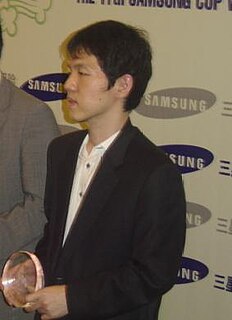
Lee Chang-ho is a South Korean professional Go player of 9-dan rank. He is regarded by many as the best Go player of the late 1990s and early 2000s. He was a student of Cho Hun-hyun 9-dan. He is the second youngest to become a professional Go player in South Korean history behind Cho Hun-hyun. He is the only player to have won all eight international competitions at least once.

Zhang Qun or Chang Ch'un also known as Zhang Yuejun (張岳軍), was premier of the Republic of China and a prominent member of the Kuomintang. He served as secretary general to the President of the Republic from 1954 to 1972 and senior advisor to Presidents Chiang Kai-shek, Yen Chia-kan, Chiang Ching-kuo, and Lee Teng-hui. Under the influence of his wife, Ma Yu-ying, he became a Christian in the 1930s.
Hideyuki Fujisawa , also known as Shuko Fujisawa, was a Japanese professional Go player. A younger uncle of another professional, Hosai Fujisawa.
Zhou Heyang is a Chinese professional Go player.
Emperor Taiwu of Northern Wei, personal name Tuoba Tao (拓拔燾), nickname Bili (佛貍), was an emperor of Northern Wei. He was generally regarded as a capable ruler, and during his reign, Northern Wei roughly doubled in size and united all of northern China, thus ending the Sixteen Kingdoms period and, together with the southern dynasty Liu Song, started the Southern and Northern Dynasties period of Chinese history. He was a devout Taoist, under the influence of his prime minister Cui Hao, and in 444, at Cui Hao's suggestion and believing that Buddhists had supported the rebellion of Gai Wu (蓋吳), he ordered the abolition of Buddhism, at the penalty of death. This was the first of the Three Disasters of Wu for Chinese Buddhism. Late in his reign, his reign began to be cruel, and his people were also worn out by his incessant wars against Liu Song. In 452, he was assassinated by his eunuch Zong Ai, who put his son Tuoba Yu on the throne but then assassinated Tuoba Yu as well. The other officials overthrew Zong and put Emperor Taiwu's grandson Tuoba Jun on the throne as Emperor Wencheng.
Zhou Ruiyang is a Chinese professional Go player.
Kang Dongyun is a professional Go player.
Empress Ashina (551–582) was an empress of the Chinese/Xianbei dynasty Northern Zhou. She was the daughter of Göktürk's Muqan Qaghan, and her husband was Emperor Wu.
Emperor Xuan of Northern Zhou ( 周宣帝) (559–580), personal name Yuwen Yun (宇文贇), courtesy name Qianbo (乾伯), was an emperor of the Xianbei dynasty Northern Zhou. He was known in history as an erratic and wasteful ruler, whose actions greatly weakened the Northern Zhou regime. As part of that erratic behavior, he passed the throne to his son Emperor Jing in 579, less than a year after taking the throne, and subsequently entitled not only his wife Yang Lihua empress, but four additional concubines as empresses. After his death in 580, the government was taken over by his father-in-law Yang Jian, who soon deposed his son Emperor Jing, ending Northern Zhou and establishing Sui Dynasty.
Li Ezi, later Buddhist nun name Changbei (常悲), was an empress dowager of the Chinese/Xianbei dynasty Northern Zhou. She was the mother of Emperor Xuan.
Zhu Manyue, later known by her Buddhist name Fajing (法淨), was a concubine of Emperor Xuan of Northern Zhou, an emperor of the Chinese/Xianbei dynasty Northern Zhou, and she was the mother of Emperor Jing.
Emperor Jing of Northern Zhou ( 周靜帝) (573–581), personally name né Yuwen Yan (宇文衍), later Yuwen Chan (宇文闡), was the last emperor of the Xianbei dynasty Northern Zhou. He became emperor at the age of six, after his father Emperor Xuan formally passed the throne to him, but Emperor Xuan retained the imperial powers. After Emperor Xuan's death in 580, the official Yang Jian, the father of Emperor Xuan's wife Yang Lihua, seized power as regent. Yang soon defeated the general Yuchi Jiong, who tried to resist him, and in 581 had the young Emperor Jing yield the throne to him, ending Northern Zhou and establishing Sui Dynasty. Yang soon had the young emperor, as well as other members of Northern Zhou's imperial Yuwen clan, put to death.
Han Huang (韓滉), courtesy name Taichong (太沖), formally Duke Zhongsu of Jin (晉忠肅公), was an official of the Chinese dynasty Tang Dynasty, serving as a chancellor during the reign of Emperor Dezong. He was praised by traditional historians for his frugality and personal integrity, but blamed for being overly harsh and cruel in his governance.

Swimming Battle is a 2016 Taiwanese romance, sports television series created and produced by Sanlih E-Television. It stars Kingone Wang, Mandy Wei, Enson Chang and Cindy Yen. Filming began on June 1, 2016 and wrapped up in October 20, 2016. First original broadcast began on July 8, 2016 on SET Metro airing every Friday night at 10:00-11:30 pm.

Missing Johnny is a 2017 Taiwanese drama film written and directed by Huang Xi. The film stars Lawrence Ko, Rima Zeidan and Sean Huang. Missing Johnny is Huang's debut feature. It is executive produced by Hou Hsiao-hsien.





